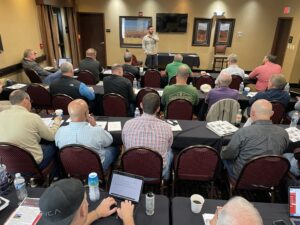
WASHINGTON (BP)–A new advance in technology may mean a new setback for one group in the human family.
The recent announcement of a screening test that can identify unborn children with Down syndrome in the first trimester has raised the specter of even more babies with the condition being aborted. Already, doctors estimate about 80 percent of mothers who receive positive results for Down syndrome in the second trimester decide to abort their effected children, according to The New York Times.
Sponsors and researchers involved in the $15 million study involving more than 38,000 American women hailed the results, which found that combined blood and ultrasound tests are able to identify Down syndrome 11 weeks after conception, The Washington Post reported Nov. 10, the day the research results were released in The New England Journal of Medicine.
“This is a big deal for women,” the head of the study, Fergal Malone of the Royal College of Surgeons in Dublin, Ireland, said, according to The Post. “In light of this study, we should offer screening to all women in their first trimester.”
Pro-life bioethicists, however, decried the news.
“Prenatal genetic tests for Down syndrome are a way of drawing a bull’s eye on an unborn baby, targeting him for abortion,” said C. Ben Mitchell, a bioethics professor at Trinity Evangelical Divinity School in suburban Chicago and a consultant for the Southern Baptist Ethics & Religious Liberty Commission. “Eliminating Down syndrome children through abortion is a particularly egregious form of eugenics.
“Routine genetic testing for disabilities will turn back the clock on all the advances we’ve made toward becoming a welcoming culture to people with disabilities,” Mitchell told Baptist Press. “What could be less welcoming than aborting children with Down syndrome?”
Randall O’Bannon of the National Right to Life Committee told The Post, “These tests appear to be used only to select babies for abortion, including as many as five percent who may not even have” Down syndrome.
The new test, which was funded by the National Institute of Child Health and Human Development, may produce not only fewer children with Down syndrome and other impairments but a reduction in research dollars for such conditions, some say. “If you can terminate pregnancies with a condition, who is going to put research dollars into it?” asked Nancy Press, an Oregon Health Science University professor, according to The Times.
Experts have said Down syndrome births should increase because of the greater age of women having children, but the number has declined instead, according to a study by the University of Connecticut Health Center. Estimated births of Down syndrome children in the United States were 3,962 in 1989 but 3,654 in 2001, The Times reported. It was projected there would be more than 7,200 Down syndrome births by 2001, according to the study. The explanation by experts is more pregnant women have had tests that resulted in more aborted children who have tested positive for the condition.
Down syndrome, which normally results when a person has three copies, rather than two, of chromosome 21, is the most common cause of developmental disability, according to the Down Syndrome Information Network. It can cause increased chances of such medical problems as heart abnormalities, vision and hearing problems, and infection.
IT’S ALL ABOUT ABORTION -– Supreme Court Associate Justice Clarence Thomas recently told law students his volatile confirmation process and the battles over other federal court nominees focus on a single issue –- abortion.
“I think we all should be honest with one another that the only issue, the central issue in all of this, is abortion,” Thomas told University of Alabama law students, according to the Associated Press. “It’s not the other things that people throw out. The whole judiciary now is being held, in a sense, hostage to that one issue.”
Some of his former clerks and other lawyers frequently say they are uninterested in being federal judges because of their dread of possible confirmation fights, he said.
“I think that’s a problem when the stars are beginning to say, ‘Thank you, but no thanks,’” said Thomas, who was confirmed by only a 52-48 Senate vote in 1991.
The current system of seeking to investigate every part of a nominee’s life should be changed, Thomas said. He has yet to meet a judge who seeks to impose his own agenda through rulings, Thomas told the students.
“The whole process of trying to ferret out the personal agenda through the confirmation process isn’t an endeavor that I think is worth the price we are paying,” he said. “I think the only thing it does is rats out the agenda of the people asking the questions.”
Thomas’ comments in Tuscaloosa, Ala., were made Nov. 11, only three days before The Washington Times reported new Supreme Court nominee Samuel Alito wrote in a 1985 application for a Department of Justice position “the Constitution does not protect a right to an abortion.” The revelation set off a new round of questioning or criticism by pro-choice senators and abortion rights advocates. Confirmation hearings on Alito are scheduled to begin Jan. 9.
EGGS SCRAMBLE PLANS -– A South Korean cloning specialist’s plans for a global effort to use stem cells from cloned embryos reportedly is falling apart.
The departure of University of Pittsburgh researcher Gerald Schatten from the team of Woo Suk Hwang of Seoul National University because of ethics problems has caused the stem cell consortium to begin to unravel, the San Francisco Chronicle reported Nov. 15. Three days after Schatten announced his withdrawal from the World Stem Cell Hub, Pacific Fertility Center, a San Francisco in vitro fertilization clinic, pulled out of the association, according to the Chronicle.
Hwang is the first researcher to clone a human embryo and extract its stem cells, which destroys the tiny human being, and the first to clone a dog, which is named Snuppy and was recently named “invention of the year” by Time magazine.
Schatten, who had been a part of the South Korean effort for 20 months, said in a written statement he was ending his collaboration with Hwang after “a breach of trust about possible egg-donor recruitment irregularities,” the Chronicle reported.
It has been reported at least one female member of Hwang’s team donated eggs for the research, a practice not permitted in the United States and other countries because it lends itself to coercion, according to the Chronicle.
Hwang had denied the charge, but Schatten said he learned the day before his withdrawal “misrepresentations might have occurred,” the Chronicle reported.
The Hwang’s team also had failed to inform egg donors of some potential dangers, according to the newspaper. Egg extraction as part of IVF procedures has resulted in death for some donors, the Chronicle reported.
–30–















